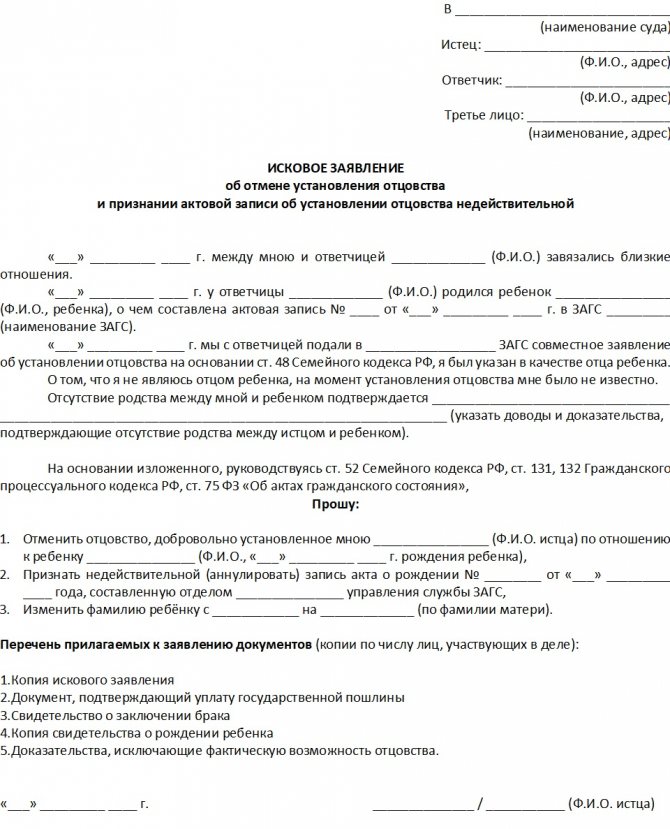Home / Parents' rights / How to revoke paternity establishment
Although the legislation of the Russian Federation does not provide for the opportunity to freely renounce motherhood or paternity, and relieve oneself of all parental responsibilities in relation to one’s own children. However, Russian courts regularly consider claims to challenge and terminate parenthood.
There are many reasons why mothers and fathers go to court with a request to annul the record of paternity. However, not in every case you can count on a positive court decision. When considering such disputes, the court is guided by the interests of the child.
Entry of parents in the birth register
The procedure for registering parents is regulated by the Family Code and the Law “On Acts of Civil Status”. According to Article 51 of the RF IC, if the parents are legally married, then the fact is recorded in the birth register after the application of one of the couple. The basis for entering information about the mother can be the child’s birth documents. Information about the father is based on a document confirming an officially registered marriage.
According to the Law “On Civil Status Acts”, a situation in which a child is born no later than 300 days after the official recording of the fact of the parents’ divorce, an entry is made as in the case described above: information about the mother - according to the child’s birth documents , about the father - according to the marriage certificate. Similarly, a record is recorded if the marriage was declared invalid or the husband died within 300 days before the child’s birthday.
If there is no official marriage between the parents, registration is carried out at the request of the child’s mother. A record of the father is by joint decision; in such a situation, both the father and mother of the child submit an application. If the fact of paternity is disputed, an entry may be made in accordance with a court decision.
If a child is born to a couple who is officially married, but as a result of artificial insemination, this couple is recorded as the parents. If the method of embryo implantation is used to carry a child by a surrogate mother, the consent of the woman who carried their child is required to register a couple in an officially registered marriage as parents.
If the child’s mother is not officially married and there is no declaration of paternity from both parties, the child is registered under the mother’s surname. This issue is resolved in a similar way if there is no court decision to establish paternity. The child's mother chooses the middle name and first name.
Situations in which an entry is made at the request of the father (if the child’s parents did not register the marriage):
- There is an official document that confirms the incapacity of the child’s mother.
- Death of the child's mother.
- The mother has been deprived of parental rights (there is a court decision).
- There is no way to establish where the child’s mother is (confirmed by authorized authorities).
Persons who have the right to demand contestation of paternity or maternity
Challenging the fact of paternity after the official entry and registration of births can be done through the courts. The list of persons who can challenge this fact includes:
- The father and mother who are listed in the book.
- The actual father and mother of the child.
- A child upon reaching adulthood.
- Official guardian.
- Guardian of the parent, if one exists on the basis of recognition of one of the parents as incompetent.
It is worth paying attention to the fact that a person who is not the actual father of the child, and this became known at the time of challenging paternity, cannot file a claim to challenge paternity. Parents have the right to challenge if they are minors but have legal capacity.
If a person confirmed paternity voluntarily and was registered by the father, this is not a basis for depriving him of the right to challenge this record. This is possible if at the time of registration the person had no reason to doubt paternity - it was not known that this man was not actually the father.
The fact of artificial insemination or surrogacy cannot be an excuse if paternity is being contested. The surrogate mother cannot challenge the fact of maternity or paternity if an official record has already been made.
According to the law, a claim to challenge paternity can be filed not only by the persons indicated in the book, but also by other persons who are not registered as parents in a specialized authority. Jurisdiction of cases is in district courts.
Use the services of leading lawyers to challenge paternity!
We will conduct a FREE analysis of business prospects!
+7
Arbitrage practice
Cases related to establishing and challenging paternity are complex not so much procedurally as morally. After all, we are talking about family and emotional family ties, the relationship between a child and parents.
But the greatest difficulty is preparing for the consideration of a case in court - drawing up a claim and collecting evidence - the result of the trial depends on how painstaking and responsible the preparation is, how well-reasoned the claim is, and how reliable and accurate the evidence is.
Enlist the help of an experienced family lawyer.
In some cases, it is easy to predict the loss of a case in a timely manner, thereby saving your own time, effort, and money.
Example 1 Citizen Yu. Pirogov 8 years ago entered into a close relationship with a woman who was already pregnant at the time of their acquaintance. Imbued with the woman’s difficult life circumstances, he decided to provide her with full support. The couple began living together.
After the birth of the child, Yu. Pirogov voluntarily acknowledged paternity.
A few years later, disagreements arose between Yu. Pirogov and his partner. Having established paternity, he decided to renounce the responsibility to raise and support his stepchild - to remove himself.
Yu. Pirogov filed a claim to annul paternity, but the court refused to satisfy Yu. Pirogov’s claim, since at the time paternity was established he knew there was no relationship with the child. In making a negative decision, the court was guided by the interests of the child.
In other cases, the chances of a positive court decision are quite high - then a lawyer will help you take the right legal position, draw up an action plan, prepare an evidence base and take part in the trial confidently and strongly.
Example 2 Citizen Voikov P. filed a lawsuit to cancel the paternity record.
At the court hearing, he indicated that 5 years ago he voluntarily admitted paternity, since he was in a close relationship with the child’s mother, and therefore was sure of the child’s origin from him. All this time, Voikov P. took care of the child and regularly paid child support.
From online correspondence maintained by the child’s mother, Voikov P. learned that at the time of conception she was in a relationship with other men. Now he reasonably doubted the origin of his son and asked the court to annul the record of voluntary establishment of paternity.
The court ordered a genetic examination, the results of which confirmed Voikov P.’s fears. The court upheld the claim and declared the record establishing paternity invalid.
Expert opinion
Semyon Frolov
Lawyer. 7 years of experience. Specialization: family, inheritance, housing law.
If you need practical advice or competent assistance in preparing for trial, you can count on a free consultation with our lawyer.
Write to the 24-hour legal support chat or call the hotline. Attention!
- Due to frequent changes in legislation, information sometimes becomes outdated faster than we can update it on the website.
- All cases are very individual and depend on many factors. Basic information does not guarantee a solution to your specific problems.
That's why FREE expert consultants work for you around the clock!
- via the form (below), or via online chat
- Call the hotline:
- Moscow and the Region
- St. Petersburg and region
- FREE for a lawyer!

By submitting data you agree to the Consent to PD Processing, PD Processing Policy and User Agreement.
Anonymously
Information about you will not be disclosed
Fast
Fill out the form and a lawyer will contact you within 5 minutes
Tell your friends
Rate ( 1 ratings, average: 5.00 out of 5)
Author of the article
Irina Garmash
Family law consultant.
Author's rating
Articles written
612
Statement of claim to challenge paternity (maternity)
A statement of claim to challenge the fact of paternity is an official document, filled out according to a sample form, to begin the process of challenging the fact of paternity in court. A person can be recognized as a father in the following cases:
- The couple is officially married - information about the father is entered automatically.
- On a voluntary basis by submitting an application.
- By the tribunal's decision.
Establishing and challenging paternity is carried out in accordance with the norms of current legislation. In a situation where it becomes known that a person is not the actual father, the right to challenge it in court is given.
Reasons:
- There was no information about the birth of the child.
- Data has emerged, supported by evidence, that the person recorded in the registration book is not the actual father.
The court must have compelling reasons to grant a claim to challenge paternity. The claim must describe in detail all the facts that prove that paternity in a particular situation cannot relate to the person recorded in the register. The document is submitted to the district court.
What do they indicate in the claim?
- Full name of the plaintiff and defendant.
- Name of the court to which the application is filed.
- The text of the statement detailing the situation.
- Copies of documents that confirm what is described in the claim, marriage certificate, birth certificate of a child.
- Signature and date.
Contestation often occurs due to the search for a way to avoid paying alimony.
The procedure for challenging the fact of paternity in court
The procedure for challenging paternity is regulated by law. Jurisdiction of cases lies within the competence of district courts. To start a case, you need to fill out a statement of claim according to the sample. This procedure requires collecting documents, filing a claim with the responsible court by a person who, according to the law, has the right to do so:
- Actual parents;
- Father listed in the registration book;
- Guardian of the child or one of the parents (in case of incapacity);
- A child, if he has reached the age of majority.
To challenge a record of paternity, compelling reasons are required. The father has the right to challenge an existing entry if at the time of making it he did not know that he was not the actual father. A person who, at the time of attempting to challenge, already knows that he is not the actual father of the child, cannot challenge paternity.
To challenge, various methods are used that make it possible to prove the absence of a connection between the child and the person who is recorded as the father in the registration book:
- Witness statements;
- Genetic examination;
- Written and video evidence.
A court decision to challenge paternity is the only legal reason for making changes to the father’s information in the registration book.
How to cancel paternity determination
So, according to Art. 52 RF IC and Art. 75 of the Federal Law “On Acts of Civil Status”, the cancellation of a paternity record is carried out by the civil registry office solely on the basis of a court decision.
If the mother or father (or other persons entitled to file a claim) can prove in court that there is no relationship between the father and the child , if this does not contradict the interests of the child himself , the court may satisfy the claim. Based on the court decision, the paternity record will be canceled by the civil registry office.
Procedure
Follow this procedure:
- Consultation with a lawyer.
- Drawing up a statement of claim;
- Collection of documents and other evidence confirming the absence of a relationship between the child and the parent, as well as misconceptions, deception or threats that were used to establish paternity;
- Payment of the state fee for filing a claim in court;
- Filing a claim in court;
- Receiving notification of the date, time, place of the first trial;
- Attending court hearings;
- Obtaining a court decision to cancel paternity and annul the act record of establishing paternity;
- Transfer of a court decision and other documents to the registry office;
- Cancellation of a paternity record;
- Obtaining a new child's birth certificate.
Statement of claim for court
The court will obtain all the most important information about the circumstances in your family, first of all, from the statement of claim. And what the court decision will be depends on how competent, complete and accurate, reasoned and reliable the claim will be.
Therefore, the closest attention should be paid to preparing the claim.
The structure and content of the statement of claim are determined by the provisions of Art. 131 Code of Civil Procedure of the Russian Federation:
- "A cap"
- The name of the court in which the claim is filed;
- Details of the plaintiff and defendant: Full name, place of residence;
- Data of the representative under the power of attorney: Full name, place of residence, date and number of the power of attorney;
- Title: “Statement of Claim for Cancellation of Record of Establishment of Paternity”;
- Statement of the circumstances of the case:
- How did the relationship between the child’s parents develop (marriage, cohabitation, divorce),
- when the child was born (full name, date and place of birth of the child),
- on what basis was paternity established (based on marriage, voluntarily or involuntarily),
- why does the plaintiff have reason to doubt paternity or allege misconception, deception, pressure,
- what confirms the absence of a relationship between the child and the identified parent (link to documentary or material evidence, witness testimony);
- Petitions: conduct an expert examination, invite witnesses, request additional documents or evidence;
- Link to legal norms (Article 52 of the RF IC and Article 75 of the Federal Law “On Acts of Civil Status”).
- Claims: cancel established paternity, cancel the record of paternity in the registry office;
- List of applications;
- Date of filing the claim;
- Signature.

Documentation
The court will not accept or consider the statement of claim if the information contained in it is not supported by documents and other evidence. Therefore, the statement of claim must be accompanied by documents that confirm each circumstance specified in the claim (according to Article 132 of the Code of Civil Procedure of the Russian Federation).
Main documents:
- Passports of the parties;
- Child's birth certificate;
- Certificate of marriage or divorce of parents;
- Receipt (cheque) for payment of state duty;
Additional documents (which confirm the absence of a family relationship between the child and the parent, an error or delusion, deception, pressure that was exerted in establishing paternity, the desire of another man to adopt a child) - depending on the circumstances :
- testimony of witnesses (relatives, neighbors, friends);
- letters, online correspondence between the parties;
- audio recordings of conversations,
- videos,
- medical documents: certificates, extracts from the medical history (for example, with data on a disease that leads to infertility), a pregnant woman’s exchange card (with data on the expected date of conception and birth),
- documents confirming separation at the time of conception of the child (for example, a business trip order, a residential rental agreement, a certificate of residence, arrest or imprisonment, inpatient treatment in a hospital or hospital),
- results of DNA genetic testing.
Procedure
Within 5 days after submitting a statement of claim to the court, the court will consider it, and if no violations are found, the claim will be accepted for proceedings.
The parties are notified of the date, time and place of the court hearing.
During the court hearing, the court will review the claim and submitted documents and ask questions to the parties. The parties have the right to answer questions from the court and ask questions to each other, present their own arguments, object to the arguments of the other party, submit additional evidence, petition the court to request additional evidence, call witnesses, or order a genetic examination.
Based on the results of the trial, the court makes a decision:
· satisfy the claim (and cancel the paternity certificate)
· refuse to satisfy claims.
Expert opinion
Semyon Frolov
Lawyer. 7 years of experience. Specialization: family, inheritance, housing law.
Based on a court decision that has entered into legal force, it is possible to cancel the recording of acts establishing paternity in the civil registry office (according to Article 75 of the Federal Law “On Acts of Civil Status”).
The civil registry office, having received a court decision to cancel established paternity and invalidate the registration record, cancels it: the record is crossed out, on the front side of the record it is indicated: “Record cancelled,” as well as the date, number of the court decision and the name of the court.
After the registration is cancelled, the mother receives a new birth certificate for the child, as well as a certificate for receiving benefits from the social security authority.
Deadlines
The legislation does not provide for a statute of limitations for disputes about establishing or challenging paternity. You can file a claim at any time without restrictions - even an adult son or daughter can challenge paternity and cancel the father’s registry.
The duration of the trial is determined by law (Article 154 of the Code of Civil Procedure of the Russian Federation) and is 2 months from the date of filing the claim. Another 1 month is the period for the court decision to enter into legal force.
The registration procedure for canceling the paternity record at the Civil Registry Office may take some more time ( up to 1 month
State duty
Services of government bodies and institutions are paid. The amount of payments is established by the Tax Code of the Russian Federation.
To file a statement of claim in court, you need to pay a state fee in the amount of 300 rubles (clause 3, clause 1, article 333. 19 of the Tax Code of the Russian Federation) - as for a claim of an intangible nature.
Payment details can be obtained directly from the judicial authority where the claim and documents are filed.
The receipt must be kept - it is documentary evidence of payment, without it the documents will not be accepted by the court.
A child after reaching adulthood.
If a person is listed as the father in the record book, he can only have two causes of action:
He has confirmed information that he is not the biological father of the child.
He did not know about the birth of the child.
The court considers the claim with the documents attached and makes a decision. Based on the decision, changes can be made to the registration book - these changes are possible only by court decision.
Witness testimony, results of genetic testing, and data from written sources can be used as evidence. Audio and video materials and other evidence are also used as evidence.
If the probable father of the child refuses to undergo an examination, but disputes paternity, then preference will be given to the arguments of the opposing side. Thus, even if the examination could prove the plaintiff’s case, but refuses it, the court will side with the evidence presented by the opposing party.
If necessary, the following may be involved in the process:
- Civil registry office employees;
- Guardians;
- Relatives whose testimony is important;
- Biological father;
- A child, but only after reaching 10 years of age.
When filing a claim, a state fee is paid. Samples of filling out a claim can be obtained from a lawyer.
Cancellation of child support after challenging paternity
Challenging the fact of paternity is possible only in a judicial procedure established by law. The simplest situation: the parents are officially married, alive, capable, they are indicated by the parents automatically upon the birth of the child.
In some situations, the “Father” column remains empty. In what situations is this possible?
- The father does not know about the birth of the child.
- The father knows about the birth, but refuses to acknowledge it and voluntarily declare it.
- Death of the father before the birth of the child.
These situations apply to couples who were not officially married.
The basis for a challenge may be the fact that the child's father indicated in the documents is not the biological father. But, at the time of registration, he did not know about it. If the person indicated in the book of records as the father had information at the time of registration that he was not the biological father, the court is unlikely to make a decision against challenging paternity in favor of such a plaintiff.
A common reason for challenging paternity is reluctance to pay child support, or avoidance of the need to make the child your heir. The need to pay alimony can only be canceled when the court has officially granted the claim to challenge it. After the relevant court decision is made, alimony is no longer collected.
Author of the article
In what cases is paternity revoked?
The court will decide to annul paternity only if there is a good reason for the annulment and irrefutable evidence of the absence of a relationship between the man and the child.
The court will consider the following circumstances to be valid reasons:
- The father was deprived of parental rights.
- He agreed to acknowledge paternity under pressure and proved this fact in court.
- Another man wants to adopt a baby.
- The father doubts his relationship with the child and will prove its absence in court.
- The man listed as the child's father on the birth certificate has been declared legally incompetent.
The court recognizes the following facts as strong evidence of the absence of a relationship between the baby and his official father:
- At the time of possible conception, the man was absent for a long time. Evidence can be any document confirming his absence, for example: a certificate from a medical institution stating that he was in the hospital at that time;
- travel certificate and tickets proving that he was in another area;
- a certificate of release, from which it is clear that the man was in prison at the time of conception.







